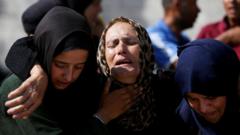An Israeli airstrike on a popular café in Gaza City resulted in numerous casualties, including women, children, and young activists. While the Israeli Defense Forces aimed to target a Hamas operative, the event has reignited debates on the proportionality of military operations amid civilian dangers.
Devastating Israeli Airstrike on Gaza Cafe Claims Innocent Lives

Devastating Israeli Airstrike on Gaza Cafe Claims Innocent Lives
A deadly Israeli airstrike at the al-Baqa Cafeteria in Gaza City killed a Hamas operative among many civilians, including children, prompting outrage over the attack's civilian toll.
An airstrike by Israeli forces on the al-Baqa Cafeteria—a vibrant café in Gaza City—has left dozens dead, amidst increasing questions regarding the ethics of military operations targeting Hamas. The cafe was a favored gathering place for locals, including artists and students, until the traumatic event unfolded. Eyewitnesses recounted the horror of the explosion, which left a scene marked by chaos and grief, with some referring to it as a "real massacre."
The airstrike, which aimed to eliminate a Hamas operative reported to be dining at the café, tragically led to widespread civilian casualties. Among the 29 confirmed fatalities were numerous women and children, prompting family members and supporters from across the globe to share their disbelief and sorrow. Reports indicate that Shifa Hospital received around 40 bodies and 72 injured individuals, many suffering severe injuries.
The Israeli Defense Forces (IDF) claimed the operation focused on terrorists, asserting that precautions were taken to safeguard civilians. However, the civilian casualty toll has ignited immediate outrage, raising serious concerns over the proportionality principle in warfare. Amid this context, many bereaved friends and family recounted their last conversations with victims of the strike.
Al-Baqa Cafeteria not only served as a meeting point but also symbolized the essence of daily life in Gaza. Its patrons embraced a sense of normalcy in an otherwise dire situation. However, due to ongoing military actions, perceptions of safety were severely undermined that day, with witnesses reporting that the attack occurred during what should have been a quiet period.
The aftermath revealed tragic remnants of civilian life: children's belongings and personal effects scattered among the wreckage, further emphasizing the human toll of such military actions. Among the lost were promising young figures, including a boxer and an artist, highlighting the potential future that was abruptly taken away.
As conflicting narratives regarding the airstrike's intent circulate, obligations to protect civilian lives in conflict situations remain hotly contested, underscoring the dire implications of military engagements in crowded civilian environments.


















